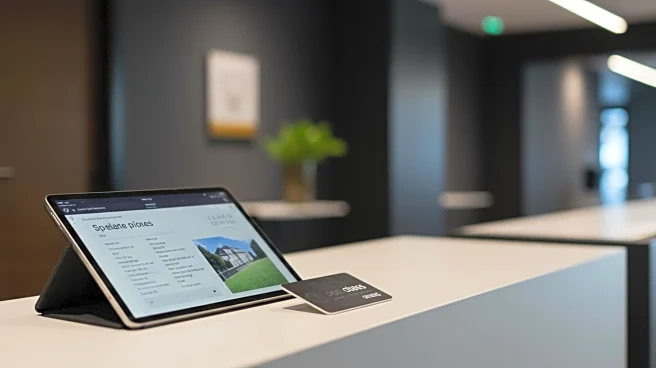What is the story about?
What's Happening?
Hotels are increasingly adopting unified technology systems to streamline operations and improve guest experiences. The integration of connected tools allows hotel staff to efficiently manage guest preferences and operational tasks without relying on multiple communication channels. For instance, TIME Hotels, operating 17 properties, conducted a tech stack audit and transitioned to a centralized system, Daylight PMS, reducing administrative workload by 30%. This shift enabled seamless operations and easier onboarding of new properties. Similarly, Ruby Hotels implemented systems with native API integrations to personalize guest experiences without burdening staff with additional logins. The focus is on interoperability and middleware solutions to harmonize data across properties, ensuring compliance with varying regulations and enhancing operational efficiency.
Why It's Important?
The move towards a simplified tech stack in the hospitality industry is significant as it directly impacts both operational efficiency and guest satisfaction. By reducing the complexity of technology systems, hotels can allocate more resources to enhancing guest experiences, leading to increased customer loyalty and potentially higher revenue. The integration of systems allows for real-time insights and personalized services, which are crucial in a competitive market. Moreover, streamlined operations reduce the burden on staff, allowing them to focus on hospitality rather than administrative tasks. This technological advancement is a strategic move for hotels to remain competitive and meet the evolving expectations of tech-savvy travelers.
What's Next?
As hotels continue to adopt integrated technology systems, the focus will likely shift towards further enhancing interoperability and data sharing capabilities. Hotels may explore additional middleware solutions to bridge existing systems and ensure seamless operations across multiple properties. The industry could also see increased collaboration with technology vendors to develop customized solutions that cater to specific operational needs. Additionally, hotels might invest in training programs to ensure staff are adept at using new systems, thereby maximizing the benefits of technological integration. The ongoing evolution of hotel technology is expected to drive innovation in guest services and operational strategies.
Beyond the Headlines
The integration of technology in hotels raises important considerations regarding data privacy and security. As hotels collect and utilize more guest data to personalize experiences, they must ensure robust data protection measures are in place to safeguard sensitive information. Additionally, the shift towards technology-driven operations may require a cultural change within hotel organizations, emphasizing the importance of continuous learning and adaptation among staff. The long-term success of these technological advancements will depend on the ability of hotels to balance innovation with ethical considerations and regulatory compliance.
















